Fayette County, Texas Biographies
The following articles were taken from F. Lotto's Fayette County, Her History and Her People, published in 1902.
Members of Fayette County Bar.
The surroundings of a man furnish very often a key, if not to his character, at least to his likes and dislikes. The building in which he dwells is in many cases a criterion of his taste. One of the oldest buildings in La Grange is the Masonic Temple, a simple, solid, massive structure. It recedes somewhat from the line of buildings fronting the street as if to indicate that conscious of its strength it can do without the attention of the public. There, in that simple, solid building has been for a generation the office of the oldest practising lawyer of the La Grange bar. His professional work in that office has made its impress on the pages of the reports of the higher Texas and United States courts. The solving of legal problems in that office has done its full share in directing the current of public opinion and giving line to the channels of business in Fayette County. Very much like the building, its occupant keeps out of the public throng. He has made the study of law his life work and devoted all his energy to it. His motto is that perseverance will reach the furthest goal.
J. C. Brown is the descendant of one of the oldest families in the United States. His great-grandfather on the paternal side was a soldier in the Revolutionary War under General Gates. His great-grandfather on the maternal side was also a soldier in the Revolutionary War and was wounded in the battle of Bunker Hill.
His father's parents were Kilbey and Rachel Jackson Brown. The former was born near Danville, Va., May 1, 1787 and died in Houston County, Ga., on October 5, 1856. The latter, nee Rachel Jackson, was born in North Carolina March 27, 1788 and died in Fayette county, Texas, December 5, 1858. Their son was W. A. (William Anderson) Brown, the father of J. C. Brown, the subject of this sketch.
His mother's parents were John and Hannah Shields Jenkins. The former was born in Holland January 7, 1789 and died in Mobile, Ala., May 13, 1858. The latter, nee Shields, was born September 17, 1791 and died April 12, 1866 in Fayette County, Texas. Their daughter was Celina Jane Jenkins, the mother of J. C.
The father of Mr. Brown of LaGrange, William Anderson Brown, a well known surgeon and practitioner of medicine in Fayette County from the winter of 1856 until the spring of 1882, was born in the state of Georgia July 27, 1818; his mother, Celina Jane Jenkins was born in Georgia May 3, 1825. They were married July 16, 1843 in Houston County, Ga. His father died March 10, 1898 in Los Angeles County, California; his mother is yet living in Los Angeles County, Cal.
J. C. Brown, the eldest child of W. A. and C. J. Brown, was born in Houston county, Ga., September 12, 1845. His parents moved to Texas in the winter of 1856 and settled in Fayette county, Texas, near the present town of Winchester and close to the Bastrop County line. J. C. was educated at private country schools at and about Winchester and later in the school in La Grange taught by Prof. R. P. Dechard. In the fall of 1863 he enlisted in Company C, 19th Texas Cavalry, and served there to the close of the civil war. He took part in the battle of Yellow Bayou and the skirmishes from Double Bridges down to Yellow Bayou in 1864. After the war he stayed at home and studied again for about one and a half years in the Winchester school. In 1867—68 he was a student in the law class of the University of Virginia. He returned to La Grange and obtained licence to practise law in August 1868 and since has devoted himself exclusively to the practise of his profession. As Hon. L. W. Moore, who was practising law when he came to the bar, is now on the bench, Mr. Brown is the oldest practising lawyer at the La Grange bar. He has occupied his present law office since July 10, 1869, a period of thirty-three years.
He married Miss Olivia J. Dancy of La Grange January 21, 1874. She was the second daughter of Col. John W. Dancy, an early settler and a prominent man in the public affairs of Fayette county up to the time of his death in 1864, and the latter's wife, Mrs. Lucy A. Dancy. To the union of Mr. J. C. Brown and Miss Dancy were born five children of whom Leon Dancy Brown, now a student in the University of Texas, alone survives. His wife died February 19, 1882 at La Grange.
He again married on October 1, 1884, choosing for his life's partner Miss Mallie [Mollie] Hill, daughter of M. H. [Malcolm Henry] and Mary Jane [Knox] Hill of Fayette county. This union has been blessed by three children; the eldest of these, Joe C. Brown, Jr., is now attending Major Bingham's school at Asheville, N. C., the second Master Mills Brown, and the youngest, Mildred Knox Brown are yet pupils in the La Grange School. – pp. 206-208
[Additional notes on Mollie Hill Brown's parents from Sandi Haynie.]
The subject of this sketch, J. T. Duncan, is an old 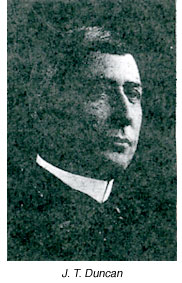 member of the Fayette County bar, a lawyer of repute and extensive practice. For years he has studied constantly all new questions of law as soon as they arose, paid the closest attention to business and served successfully his large clientage. Besides being a master in his profession, he has acquired by extensive reading a liberal education. He takes an interest in all public questions, but not to such an extent as to push himself into the front as a leader. in fact, he admitted to this writer that he had made only one political speech in his life and that was fifteen years ago. He is the descendant of an old family of Washington County, Texas. His father belongs to one of the first and earliest families of Kentucky, his mother to an old family of Pittsburg, Pennsylvania.
member of the Fayette County bar, a lawyer of repute and extensive practice. For years he has studied constantly all new questions of law as soon as they arose, paid the closest attention to business and served successfully his large clientage. Besides being a master in his profession, he has acquired by extensive reading a liberal education. He takes an interest in all public questions, but not to such an extent as to push himself into the front as a leader. in fact, he admitted to this writer that he had made only one political speech in his life and that was fifteen years ago. He is the descendant of an old family of Washington County, Texas. His father belongs to one of the first and earliest families of Kentucky, his mother to an old family of Pittsburg, Pennsylvania.
His maternal grandfather Dallas came to Texas in 1833 and settled near Independence, Washington County. His father, George J. Duncan, also came to that county and settled there in 1839; he took part in Somervell's mismanaged expedition, but went only as far as Laredo with him, when he and two hundred others, having no faith in Somervell, made use of his permission to return home and marched off under Colonel Bennett, thus escaping the disaster that overtook the balance of the expedition at the battle of Mier (Dec. 19., 1842). On his return to Washington, he resumed blacksmithing as his occupation. In 1851 he was married to Miss Bettie Dallas of Washington County. He resided in Washington County to 1880, when he moved to Milam County; there he died at a ripe old age in 1893. His union with Miss Dallas was blessed with five children.
The subject of this sketch, their son, J. T. Duncan, was born in Washington County, Texas, in 1854. He was educated in Baylor University at Independence, then an institution of great repute, and graduated in 1877. It was there that he acquired a love for self-study and investigation which should prove such a great advantage to him in after life. Immediately after graduation he entered the law office of Timmons & Brown of La Grange as a law student. He was admitted to the practice of law in June 1878 and subsequently formed a partnership with R. J. Andrews which lasted till 1881 when the latter died. He was appointed Mayor of La Grange in 1878 and was then elected and served in that office till 1882. Since that time he has not aspired to public positions. He is attorney for the San Antonio & Aransas Pass Railway Company, a position he fills to the entire satisfaction of the people interested. In January 1885 he formed a partnership with Judge L. W. Moore, distinguished as Member of Congress and District Judge, under the firm name of Moore & Duncan. In 1897 the partnership was dissolved, and in the same year he formed a partnership with W. S. Robson, which is continued to the present time.
He was married January 11, 1881 to Miss Genelle Harris of Bellville, Texas, the eldest daughter of Ben T. Harris, deceased. This union was blessed with three children, Miss Josephine, Miss Frankie and Douglass, all at home.
Mr. Duncan is a member of the A. O. U. W. and Knights of Honor. — pp. 208-210
Such readers as are not personally acquainted with Hon. H. M. Garwood, have at least often heard of him as an eloquent speaker, an able debater and a close reasoner. Hon. Garwood is a member of the old established law firm of Brown, Lane & Garwood and a member of the Bastrop, LaGrange and Houston Bar. He is a resident of Houston, but is called to practice in the courts of South Texas generally. He has repeatedly been elected to or honored with public offices. His present office is regent of the State University.
The parents of H. M. Garwood were C. B. and Frances Garwood, nee Walker. His father was a prominent merchant of Bastrop, where he died in 1886. His aged mother still resides there. H. M. was born January 11, 1864. He was educated at the University of the South at Sewanee, Tennessee, and graduated in that institution n wit the degree of Bachelor of Science. After his return from the university he studied law at Bastrop in the office of present Governor J. D. Sayers. He was admitted to the bar November 4, 1885. He began the practice of law with R. L. Batts of Austin, Texas, was associated with Hon. G. W. Jones and Capt. B. D. Orgain at Bastrop, Texas, and on August 1, 1899, formed partnership with J. C. Brown and Jonathan Lane at La Grange. Hon. H. M. Garwood has taken a great interest in all public questions; he has studied and discuss3d them before the people. He is exceedingly popular and has secured every office for which he went before the people. From 1886-88 he represented Bastrop County in the Lower House of the Twentieth Legislature; from 1888 to 1890 he served as county judge of Bastrop County; from 1890 to 1892 he represented Bastrop County in the Senate of the Twenty-Second Legislature. In all these offices his eminent services attracted the attention of the people and gained him a wide-spread reputation.
Hon. H. M. Garwood was married August 8, 1890 to Miss Hettie Page, daughter of Col. P. D. Page of Bryan, Texas. They are the parents of three children: Calvin Garwood, age seven; St. John Garwood, age five, and Louise Garwood, age two and a half years. — pp. 210-211
Judge A. Haidusek is known generally throughout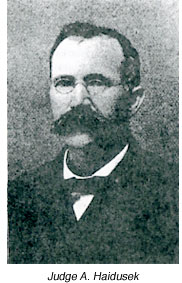 the state, but his peculiarities are known only to his intimate friends. As these peculiarities constitute the man, some of them may be mentioned. He possesses a wonderful perseverance and indefatigable energy; hence his efforts have been crowned with success; is of strong will power, but no obstinate – and of decided views on all questions which he never hesitates to express if requested to do so; but generally keeps his own counsel, knows what he wants and how to obtain it; is very liberal, generous and always ready to help the needy. Has many warm friends, but also some bitter enemies. May be pronounced a self-made man. Speaks English, German and Bohemian and is possessed of fair general information.
the state, but his peculiarities are known only to his intimate friends. As these peculiarities constitute the man, some of them may be mentioned. He possesses a wonderful perseverance and indefatigable energy; hence his efforts have been crowned with success; is of strong will power, but no obstinate – and of decided views on all questions which he never hesitates to express if requested to do so; but generally keeps his own counsel, knows what he wants and how to obtain it; is very liberal, generous and always ready to help the needy. Has many warm friends, but also some bitter enemies. May be pronounced a self-made man. Speaks English, German and Bohemian and is possessed of fair general information.
His parents were Valentine Haidusek, nee Kladiva. They as well as their ancestors were tillers of the soil and resided at Missi – a village in the northeast of Moravia near the Carpathian Mountains where they owned considerable land which Valentine Haidusek inherited from his father, George Haidusek. This was the birth place of A. Haidusek (born September 1846). His mother died in the first par of 1847 – leaving surviving her three children and her husband; the oldest, Theresa, now Lebeda, residing in Fayette County the next, John who died in Capt. Alexander's Company at Browsville, February 13, 1863, and the youngest, Augustine. After the death of his mother he was placed in the care of Mrs. Machacek, his aunt, who kept him until his father married Miss Mary Broz in 1848, who resides with her son Hynek Haidusek on the family homestead, three miles west of Schulenburg.
In September, 1856, his father left the old country with his family for Texas and in November landed in Houston. From there they traveled in an ox wagon to LaGrange where they resided two weeks, then settled on East Navidad, now Dubina, with six other Bohemian families. They were the first Bohemians that settled west of the Colorado River. From that place her[sic.] father moved on the farm west of Schulenburg and died there December 23, 1867.
Augustine had some knowledge of the Bohemian before leaving the old country, and in this country his father became his teacher. Of the English language he knew nothing until the beginning of the Confederate war when he went to school to old man Black. in 1863 he went with a drove of beeves to Louisiana which swam the Mississippi at Port Hudson and were sold to the confederate government. Upon his return he enlisted in Company F, Bates' Regiment, stationed at Velasco, June 6, 1865, he returned home and helped his father to make a crop. In 1866 farmed and went to school to old man Mays below Weimar. In 1867 clerked for G. W. White in La Grange for several months, then went home and in the fall cut and split 4000 post-oak rails for George Morysak and studied English by firelight.
In 1868 he farmed and during the summer taught school, and in 1869 settled in La Grange, read law in the office of Messrs. Jarmon & Cross and on December 22, 1870, was admitted to the bar. He was the first Bohemian to be admitted to practice law in the United States. During the congressional campaign between John Hancock of Austin and Degner of San Antonio and between Giddings of Brenham and Clark of Galveston, he worked hard for democracy. Both democrats were elected. Those were trying days for democracy in Texas. Elections were held at county seats and voters were under police supervision, but they submitted to it, knowing that liberty was at stake. In 1872 he taught school at Ross Prairie, near Fayetteville, and in May of that year married Miss Anna Becka, a daughter of John and Catherine Becka, who resided at Ross Prairie. miss Anna Becka, now Mrs. A. Haidusek, was born near Bellville, Austin county, Texas, in June 1856. Five children were born to A. and Anna Haidusek, of whom Jerome, George and Vlasta are living. Their first child, a boy, and the last, a girl, are dead. Jerome married Miss Fannie Mosig and Vlasta married Joseph Koss. George is a student of the State University at Austin, Texas.
In 1874 A. Haidusek was elected chairman of the democratic executive committee of Fayette County. At the city election of 1875 he was elected mayor of LaGrange, defeating Mr. A. H. Brandt. He was the first Bohemian mayor elected in the United States. Re elected in 1877, defeating P. Y. McAshan. During the campaign of 1878, he ran for the office of county judge against Hon. J. C. Stiehl, but was defeated.
In 1880 the democrats, assembled in convention in Giddings, nominated him as a candidate to represent the counties of Fayette and Lee in the Seventeenth Legislature. He accepted the nomination in an open letter in which he stated that, if elected, he would advocate the measure s of the minority platform which had been rejected by the democrats at a state convention held at Dallas. He was elected, defeating John L. Smith by over 2000 majority. In the legislature he introduced two amendments to the state constitution, one to amend the immigration clause so as to authorize the dissemination in foreign countries of the revenues and benefits of Texas, one to authorize the investment of the permanent school fund in county, bonds, etc. Both propositions were defeated. He opposed the amendment to the constitution proposing to require voters to pay their poll tax before allowing them to vote which was introduced by C. L. Wurzbach of San Antonio, and secured the amending of the law, compelling county convicts to work public roads. In 1882 he was urged by some of his friends to run as an independent candidate for the office of presentative in congress, to which he replied in an open letter that he was a democrat for principle, not for office, that he proposed to stand by the democracy because the party in 1856 when "know-nothingism" was rampant stood by the foreigners. In 1884 he was elected county judge of Fayette County, defeating Hon. J. C. Stiehl. Served six years as judge. Worked zealously to improve the public schools and especially the teachers. Required the school trustees to employ teachers able to teach the English language, urging the teachers to make English the language of the school. For this he was pronounced a renegade by nearly all the Bohemian papers in the United States. Particularly the Slovan, a Bohemian weekly, published and edited by Joseph Cada at La Grange, Texas, very much incensed the Bohemians of Texas against the judge and they held indignation meetings, condemning his efforts in trying to make English the language of the school-room in Bohemian localities. To counteract the evil tendencies of the Slovan, the friends of the judge stated another Bohemian paper, the Svoboda. It was a joint stock company, consisting of about fifty members. A man from New York was employed to run the paper. The Svoboda was started December 1885, and in 1887 had about 400 subscribers and $2400 indebtedness. The New York man, Mr. Chuduba, was discharged and A. Haidusek took charge of the paper. Under his management the number of subscribers increases rapidly and the debt was paid off in two years. In 1890 the judge became the owner of the paper; since then he has devoted it his entire time and made it one of the best paying papers in the country. Its circulation is about 4000. It has subscribers in sixty-four counties in Texas, besides in other states and in the old country. It is a Bohemian paper, but thoroughly American in sentiment.
During the administration of Judge Haidusek public roads were graded and macadamized. Nineteen iron bridges were built and the bridge spanning the Colorado River at La Grange was bought which required the deciding vote of the judge. For this act he was condemned by many citizens of the county. Some also condemned his efforts to grade public roads, claiming it would bankrupt the county. The contract to build the present court house was made and the foundation laid for the same during his administration. In 1890 he was defeated for re-election by Hon. W. S. Robson.
In the split of the democracy into Hogg and Clark factions,Judge Haidusek espoused the cause of Judge Clark. Although an advocate of the gold standard, he supported Bryan at both elections, evidently not wishing to abandon democracy. But in the congressional fight between R. B. Hawley, the republican nomine, and W. S. Robson, the democrat, the judge supported Hawley, and it is claimed that on this account Robson was defeated. When the First National Bank of La Grange was in a depressed condition, the judge became associated with it; late on was elected its president which position he now holds. Since then the bank not only overcame its depression, but has been paying its stockholders semi-annual dividends for several years.
The judge is a member of the K. H., A. O. U. W. and an honorary members of the C. S. P. S., a Bohemian order, the same as K. of H. All the members of his family as well as himself are communicants of the Catholic Church.
The subject of this sketch is a young man of great promise. 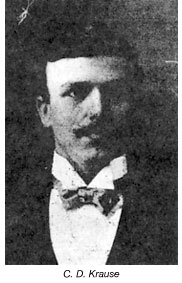 After passing a very creditable examination, he was admitted to the bar on November 22, 1895, but did not engage in actual practice until five years later; he remained with his employers – then the firm of Brown, Lane & Jackson, by whom he was employed as stenographer – and continued to lay the foundation for his future professional career.
After passing a very creditable examination, he was admitted to the bar on November 22, 1895, but did not engage in actual practice until five years later; he remained with his employers – then the firm of Brown, Lane & Jackson, by whom he was employed as stenographer – and continued to lay the foundation for his future professional career.
Carl Krause received his rudimental education in Germany; after coming to his adopted country, he attended the public schools of the city of Houston and also received private tuition, and then attended the Conyngton business college in said city, where he learned the mysteries of stenography.
Carl David Krause was born on July 23, 1874 at Cassel, Germany, where his parents, Frederick Reinhart Krause and Fredericka Krause nee Kersting, resided. His parents died while he was yet in early childhood. He came to the United States during the month of May, 1885, residing at Houston, Texas, with his uncle, Chas. F. Zinke, until June, 1891, when he came to La Grange to accept the position of stenographer with the firm of Brown, Lane & Jackson, with whom and their successors he remained until June 1, 1900, at which date he formed a partnership with Hon. C. E. Lane, under the firm name of Lane & Krause. This firm in September, 1901, consolidated with the firm of Brown, Lane & Garwood, of which he is now the junior member.
On January 4, 1899 Carl Krause was married to Miss Lena Scholz of La Grange. They are the parents of a boy – Hilmer by name – born on November 25, 1899.
He at present is W. M. of Lafayette Lodge No. 34, A. F. & A. M., is a Past Sachem in the Order of Red Men and a K. of P.
There is hardly a man in Fayette County who does not 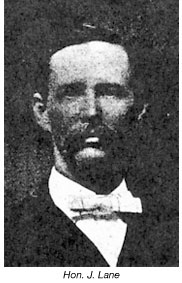 know or is not familiar with the name of Hon. Jonathan Lane. Hon. J. Lane is now a resident of Houston. Before his removal to that city, he was one of Fayette County's leading citizens. Being of strong convictions, he very often declared them in unmistakable language. In the prohibition campaign of 1887 he was the ablest anti-prohibition speaker in the county. His able campaign gained him a large crowd of enthusiastic friends. There is no man who is more popular with the German Bohemian elements than he. He still exerts a strong influence in the county, the number of his friends having rather increased. Hon. J. Lane is an advocate of the fundamental democratic doctrine of personal rights and local self - government. He believes that those people are the best governed who are the least governed and he holds that the powers of the government should be limited as much as possible or at least as far as is consistent with government.
know or is not familiar with the name of Hon. Jonathan Lane. Hon. J. Lane is now a resident of Houston. Before his removal to that city, he was one of Fayette County's leading citizens. Being of strong convictions, he very often declared them in unmistakable language. In the prohibition campaign of 1887 he was the ablest anti-prohibition speaker in the county. His able campaign gained him a large crowd of enthusiastic friends. There is no man who is more popular with the German Bohemian elements than he. He still exerts a strong influence in the county, the number of his friends having rather increased. Hon. J. Lane is an advocate of the fundamental democratic doctrine of personal rights and local self - government. He believes that those people are the best governed who are the least governed and he holds that the powers of the government should be limited as much as possible or at least as far as is consistent with government.
Hon. J. Lane was born October 15, 1853, in Alabama. He went to private country schools of the Oso neighborhood in Texas whereto his parents had moved from Alabama, when he was only one year old. His parents were C. J. and E. E. Lane, and he is a brother of C. E. Lane and Thos. W. Lane. He engaged in merchandising in 1880 and later associated himself with Mr. Arnim of Flatonia under the firm name of Arnim & Lane, of which firm he is still a member. He studied law from 1880 to 1882. In the latter year he was admitted to the bar. Was a member of the Senate of the Twentieth and Twenty-First Legislatures *1886-90), having drawn a four year's term.
He was married in 1876 to Miss Alma Harrison of Flatonia.
Hon. Jonathan Lane is a leading lawyer of the state. His practice extends throughout South Texas. He is a member of the firm of Brown, Lane, Garwood, Lane & Krause, with offices in Houston, La Grange and Bastrop. Mr. J. Lane is an eloquent speaker. Following the dictates of his own conscience, he chooses on every public question the side which his convictions tell him to be the right, and, believing his position to be right, he maintains it with great ability, in general not waiting to be attacked, but rather leading an attack on his opponents. He is equally brilliant in his utterances of defense and attack, in preparing political campaigns and in their management he evinces a dash and daring that surprise and confuse his political opponents. — pp. 217-218
As is the case with all Lanes, the name of C. E. Lane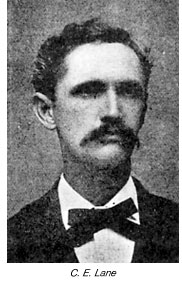 is noted for energy, ability and honesty. He is outspoken in his likes and dislikes – either a warm friend or an honest enemy. He does not hold back with his views, leaving the people in the dark about them. But sincerely convinced of their correctness and noting the dangers of the opposite views, he manfully takes his stand and explains his ideas. A man of such courage and sincerity has his enemies and he also has his warm friends. However enthusiastic the praise from his friends, however bitter the censure of his enemies, to the people he always appears as a sincere and truthful man who has the courage of his convictions. For thirteen years he has been a practicing lawyer of the county and is now connected with the old reliable firm of Brown, Lane & Garwood.
is noted for energy, ability and honesty. He is outspoken in his likes and dislikes – either a warm friend or an honest enemy. He does not hold back with his views, leaving the people in the dark about them. But sincerely convinced of their correctness and noting the dangers of the opposite views, he manfully takes his stand and explains his ideas. A man of such courage and sincerity has his enemies and he also has his warm friends. However enthusiastic the praise from his friends, however bitter the censure of his enemies, to the people he always appears as a sincere and truthful man who has the courage of his convictions. For thirteen years he has been a practicing lawyer of the county and is now connected with the old reliable firm of Brown, Lane & Garwood.
He was born January 20, 1856 at Oso, Fayette county, Texas, three miles northwest of Flatonia. He went to private schools at Oso, then engaged in farming till 1877 and moved in that year to Flatonia. Here he clerked for a number of years. In 1881 he became a partner in the mercantile firm of Harrison & Lane. In this firm he stayed till 1883 when he dissolved partnership and traveled as a salesman for T. W. House of Houston, Texas, a wholesale grocer and cotton factor. He traveled for this firm eight months and in the same year (1883) , after the death of his father he again engaged in the mercantile business under the firm name of C. J. Lane & Co. In 1889 he accepted a position as traveling salesman for Wallis, Landis & Co. During all this time as clerk, merchant and salesman he had studied law at home as well as on the road whenever he had a chance. In 18889 he received his license to practise law. After the resignation of George Willrich as county attorney in 1890, he was appointed to that office by the commissioners' court. In the fall of that year he was elected to that office and served in it for one term. In 1898 and 1900 he was elected to the legislature by decided majorities. He has been a practising lawyer of La Grange since 1889 and now enjoys an extensive practice. On February 6, 1884 he married Miss C. Y. Cox of Flatonia. They are the parents of six children: Edna and Earl, twins, 17 years old; C. J., 12 years of age; Alma, 9; Floyd, 7, Gessner, 2. They all stay at the home of their parents. — pp. 218 - 219
Thomas W. Lane deservedly has a host of friends in all parts of the county. He is a gentleman of quiet and unassuming manners, an able lawyer and a true friend. By his congenial ways he soon gathers friends around him wherever he goes. He is a member of the law firm of Wolters, Lane & Lenert, a well known law firm which transacts as much legal business as any other firm in the county.
His parents were C. J. and E. E. Lane, nee Crockett. They were married at Decatur, Morgan County, Ala. His father was engaged in the mercantile business at that place. In 1854 he moved with his family in ox wagons across the country to Texas, bringing along with him his negroes. He settled in the neighborhood of the former town of Oso, a name that has now disappeared from the map of Texas. (Oso was situated about three miles northwest of Flatonia.) There he engaged in farming and preaching up to 1875. Then he started in the general merchandise business in Flatonia which he managed till the time of his death in 1883. His wife died in Flatonia in 1888.
Thomas W. Lane was born at Oso December 7, 1865. He was educated in the public schools of Oso and Flatonia and in the Southwestern University at Georgetown, Texas. After graduating in that institution he studied law under Phelps & Lane and was admitted to the bar (Dec. 7, 1888). From 1888 to 1893 he practised law in Flatonia. In 1893 he moved to La Grange, where he formed a partnership with Hon. J. F. Wolters (in 1898). December 28, 1891 he was married to Miss Jessie J. Drake at La Grange.
he resides at present at Beaumont as the manager of several oil companies and as the superintendent and secretary of the London Oil & Pipe Line Company with headquarters at Beaumont, Texas.
Thomas W. Lane is a comparatively young man with the highest prospects for him. There is no doubt in the mind of this writer that a succeeding biographer will have to devote his life considerably more space, if for no other reason than to record the successes which he is about to achieve in connection with the Beaumont oil business. — pp. 220-221
A more polite, affable and accommodating gentleman than Geo. E. Lenert would be hard to find in this county. Mr. Lenert enjoys the advantages of a superior education, having been a student at the Davis Military School at Winston, N. C., and an alumnus of the Washington and Lee University at Lexington, Va. He has traveled extensively in Europe and visited most of the larger cities of Germany, France and England. His talks on the manners and habits of these different peoples are certainly more interesting than any book ever written on these subjects. Mr. Lenert is very sociable and takes a great interest in all society affairs. He is the junior member of the reliable law firm of Wolters, Lane & Lenert, and pays a great deal of attention also to the fire insurance business.
The parents of Geo. E. Lenert are A. E. and Emilie (Schuhmann) Lenert. His father was born at Klausthal, Hanover, his mother was born on board a ship. His father came to Warrenton and was for a long time engaged as clerk at the store of Wm. Neese. Later he established himself in the mercantile business and conducted it for a number of years, acquiring a reputation for honesty, reliability and hard business sense. He married Miss Emilie Schuhmann of Warrenton.
Their son, Geo. E. Lenert, was born December 31, 1871, at Warrenton, Texas, and received there in the public schools his first instruction. After completing the course of that school, he attended for two years the Davis Military School at Winston, N. C. (1889-91). In 1891 he entered the Washington and Lee University of Lexington, Va. He attended this institution for four years (1891-95). After graduating in that institution he was admitted to the bar of Virginia in 1895 and to the bar of Texas in 1896. He located in LaGrange. Soon after hanging out his shingle as a practising lawyer, he formed a partnership with Sam Lowrey under the firm name of Lenert & Lowrey. This partnership lasted till 1898, when it was dissolved. In 1900 Mr. Lenert made a trip to Europe, visiting all the larger cities of Germany, France and England. After his return from Europe; he again started in the practice of his profession and, in November, 1900, he formed a partnership with Wolters and Lane under the firm name of Wolters, Lane & Lenert.
Mr. Lenert has proven himself in every way worthy of the high reputation for honesty and reliability inherited from his father. He is a painstaking lawyer who sifts his cases to the bottom and on these accounts he is steadily gaining recognition as a lawyer in the front rank of his profession. — pp. 221-222
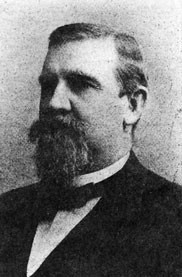
L. W. Moore |
Like most men who have succeeded in life Judge Moore owes much of his success to his wife.
At the outbreak of the war between the States, Judge Moore became a captain in Col. Flournoy's regiment. In 1865 upon his return from the war, he removed to La Grange. In 1875 be was elected to the Constitutional Convention, which drafted our present State Constitution. He was conspicuous as a leader in that body of able lawyers, and soon enjoyed the confidence of the people of his section to such an extent that he was elected District Judge in 1876, which office he held for eight years. In 1886 he was elected to Congress, where he remained until 1892. He again commenced the practice of law. In March 1901 upon the death of Judge Teichmueller, Gov. Sayers appointed Judge Moore, Judge of the 22nd Judicial District, which office he now holds. — pp.222-223
The picture below is the likeness of Edward H. Moss, a young man of sterling worth and great promise. He is a man of great energy, industry and perseverance. It is such kind of material the coming men of our country are made of. While teachings . . .
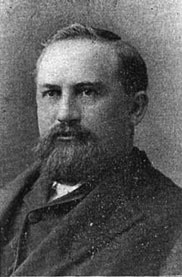
Judge. W. S. Robson |
The parents of Judge Robson were John R. and Ann K. Robson, residents of Madison County, Ga. They came to Texas in the year 1854 and settled in the neighborhood of Roundtop where they farmed. His mother died at Roundtop in 1869. In 1863 his father moved with his family to La Grange where in 1867 he died of yellow fever.
Judge W. S. Robson was born in Madison County, Georgia, February 4, 1851. In April, 1854, he moved with his father to Texas, who settled at Roundtop. In 1863 after the death of his mother he came with his father to La Grange. W. S. Robson was educated in the public schools at Roundtop and La Grange. In later years, he constantly perfected his education by extensive reading and study. After the death of his father he started life as a butcher. Already then, Judge L. Moore, recognizing his ability, suggested to him the study of law. But first he had to make a living. Then he first filled several offices, before he commenced the study of law. In 1872 he was elected Animal and Hide Inspector in which office he served to 1874. From 1874 to 1876 he served as Deputy District Clerk. In February, 1877, after the adoption of the Constitution of 1876, he was elected assessor and re.elected in 1878. During these two terms as assessor he studied law under Timmons and Brown. He was admitted to the bar in 1881. In 1884 and 1886 he was elected chairman of the democratic executive committee of the county. In 1885 he was elected messenger to carry the presidential vote to Washington. In 1890 he was elected county judge which office he held for three terms till 1896. In that year he also was a member of the democratic state executive committee and delegate to the democratic national convention. In 1898 he was elected Supreme Master Workman of the A. O. U. W. of the United States and Canada. This order numbers over 450,000 members. Judge Robson is still the chairman of the Committee on Laws of the order and life member of the Supreme Lodge.
Judge Robson was married to Miss Lucy Pretorious of La Grange in 1876. They have eight children, of whom two sons and two daughters are grown.—pp. 227-228

